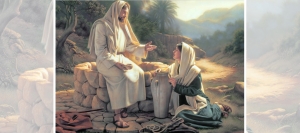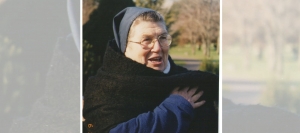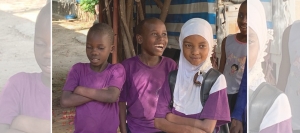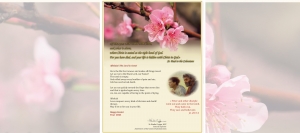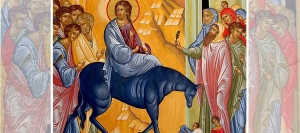Redazione
May 2021
"Unexpected Encounters"
Rosanna Evangelista
The ASC of Argentine to Hna. Marìa Mossa, ASC
She lived as a woman of faith and deep missionary zeal. Her heart led her, without hesitation, to set out for Formosa, 1300 km away from Villa Bosch (she consumed only galetitas and café on the trip), to take care of the lives of the sisters who lived so far from the other communities.She lived as a woman of faith and deep missionary zeal. Her heart led her, without hesitation, to set out for Formosa, 1300 km away from Villa Bosch (she consumed only galetitas and café on the trip), to take care of the lives of the sisters who lived so far from the other communities.Sr. Maria harmonized her femininity, cultivating numerous friendships with the Pastors of the Church, bishops and priests, nuns and lay people. All this made her a woman whose harmony was also visible in the architecture of the Preciosísima Sangre College, admired for the originality of its almost circular structure, for its luminosity, for the details that reveal its broad vision of an educational space in the interaction of the city.Sr. Maria from Heaven, intercede for all of us, especially for your beloved Land of Argentina. We are proud to have had you as a sister.
Sr. Patricia Ataria, ASC


Visit to Tanzania
I have been to Tanzania various times by now, but each time is as if it were my first time. I am always deeply struck by the welcome of a cordial, open and peaceful people. Each time I am able to appreciate new aspects that make me feel not only at home, bu allow me to appreciate the richness of a different and marvellous culture.
This time the experience was even stronger especially because the world pandemic situation brings me to feel the suffering of an unprecedented crisis upon me and within me. Everything we are called to live in this particular historical moment has an added value. There are many feelings that act as a filter to the reality we experience and nothing anymore seems to be what it was before.
I experienced days when I tried to give room to welcoming everything I was able to pick up on trying to live each second deeply and letting the newness resound within me with all its richness.
When I arrive in Dar Es Saalam, I immediately had the sensation of exiting a surreal experience. After a year of physical distancing, of pressions and fears of infection, of precautions and limitations, of numbers and forecasts … of lockdown, infections and deaths … I found myself immersed in a reality with daily challenges of the same magnitude and, for a second, Covid-19 seemed a far-off thought. I was aware that those who live in situations of poverty do not have the opportunity even to be aware of what is often happening around them and that the world economy truly rules the fate of humanity.
I was welcomed by the Sisters with much joy. This trip was a time of great fraternity when, after overcoming the physical distancing that the pandemic has imposed on us, we were able to express that nearness and sisterliness that was good for the heart. I felt embraced and supported by the entire Congregation, appreciated through gestures of closeness and encouraged to look to the future with hope in spite of the times of uncertainty, to be “craftsmen of communion.” I heard about experiences of faithfulness tried by suffering, of courage, peaceful witness though living in uncertainty, of sharing, care and nearness … of charity and service at the cost of life.
We worked on processes already begun, mutually listening to each other in an attitude of searching and openness to listen to the voice of the Spirit to reach an autonomy that is very close.
Together with a group of responsible men and women and volunteers we are finishing up the achievment of a new management and administrative structure for the Village of Hope. There is much synergy and synodality that is allowing the fostering of transformation in respect of the diversities and uniqueness. We tried to encourage the culture of encounter and dialogue by fostering times of sharing and discussion among the people with various experiences to broaden the participation and co-responsibility in the awareness that each culture has its heritage of uniqueness and richness. We have never experienced how everything is connected, everything is in relationship, everything is linked together like we have in this time of pandemic. Nor have we been aware of how truly fundamental synergy of the diversities is.
During my stay, the Tanzanian people experienced the death of their President, John Magufuli, a controversial populist leader who, in five and a half years of govening has deeply changed the country, thanks to his commitment to cultural, spiritual, political and economic growth and development. Aside from the controversy about Covid-19, during his first term of office he cut the salaries of the government employees (including his own) in order to increase funding for hospitals and HIV/AIDS drug allocations. In 2015, he cancelled the celebrations on Independence Day and used the money to launch an anti-cholera initiative. Health care was one of the highest priorites of the Magufuli administration, in part testified to by the fact that the life-expectancy rate in Tanzania increased every year of his tenure. I saw a growing country. Improvement of infrastructure, roads, airports are positioning Tanzania for continuing its growth trajectory.
I attended the ceremonies of farewell for the President along with the Sisters. I saw an immensity of people who were suffering because of the death of their leader, manifesting pain for the loss of a “father”, feeling the strong link with their authority and a strong sense of belonging to the nation. I was very touched by the people, guardians of important values in this time of great uncertainty. It was a very strong experience for me.
I thank the Lord for having allowed me to experience this opportunity of service and I thank the Sisters for the warm hospitality they showed me and for their life witness.
Brothers and Sisters of everyone, regardless of faith, culture and traditions, because the future is not monochromatic. (Fratelli tutti, 100) and the world is like a polyhedron that lets its beauty shine through, right through its different faces.
Sr. Nadia Coppa, ASC
April 2021
Happy Easter!
Happy Easter! The Lord is risen!
Happy Easter! The Lord is risen! Jesus, the living One is with us always! He is within us as eternal, tender, strong love... as living, certain hope. Jesus is our Easter: the profound motivation of our living, our acting, our choosing... our dying, of our starting afresh each day in newness.
Let us celebrate today, with a new awareness, in these dark and sad times, the certainty of Christ's victory over death. This is our vocation. We are called to the Resurrection, to live eternally in God! Death has been defeated by Christ's victory and this not only fills us with joy, light and hope, but it also gives us a certainty: every event we live, every moment of our lives, has a profound meaning because it is mystically inserted in Christ's Easter.
So today, we celebrate new life, the life of the risen. Jesus, the Living One, draws us with him into the dynamism of the life of the risen. It is the Feast of the seed that opens to bear fruit, the Feast of the turgid bud that opens to the warmth of the spring sun, but it is also the Feast of empty tombs, because every boulder is taken away by the power of love that triumphs.
In the Gospel passage given to us on this Sunday we hear of the encounter of Mary Magdalene, Peter and John with the Risen Lord: at an empty tomb. They saw and believed.
On the first day of the week, Mary of Magdala went to the tomb in the morning, when it was still dark, and saw that the stone had been removed from the tomb. Mary then ran and went to Simon Peter and the other disciple, the one Jesus loved, and said to them, "They have taken the Lord away from the tomb, and we do not know where they have put him!" Peter then went out with the other disciple and they went to the tomb. They both ran together. They saw and believed.
This Scripture describes the dynamism of love: love moves and renews all things. It tells us of the race of Mary, Peter and John at the dawn of the new day... shining with splendor, wonder and amazement.
Mary is the first to leave the house when it is still night. It is dark in the sky, but it is also dark in her heart. She has nothing in her hands, only her love that rebels against the death of Love and a song, a canticle: "I will get up...I will go around the streets asking: 'have you seen the love of my soul?” (Song of Songs 3:2-3)
Peter and John are also crushed by a rock: pain for the death of the Master, but they remain together, they continue to believe in the fraternity wanted and loved by the Master.
They see and believe. "He is not here." What a beautiful expression! He is alive, the Living One is not here, but is elsewhere. He is everywhere: he is in the heart of every person, in the often wounded life of every brother or sister, he is in the events of your daily life. He precedes us to Galilee, there in our daily lives, which often seem to us very limited.
Those who, like him, want new heaven and a new earth, know that those who live like him, making a gift of themselves, already experience eternal life, already see the beauty of the Resurrection every day in the world. Today is the Feast of new life, the Feast of the risen and the Resurrection is that experience of fulfillment we are all called to experience. It is our vocation to new life. Let us allow the Spirit to refine our sensitivity and make us capable of seeking "the things above" in order to "find God present in all things." Easter is now; it is here.
Let us run towards the Risen One! Let us run quickly towards the Hope that does not disappoint. Then it will be Easter. May it be for me. May it be for you. Many wishes.
Palm Sunday: Fraternity and Paths of Peace - "Christ Jesus emptied himself." (Phil 2:7)
With Palm Sunday we enter Holy Week, and the rhythm of the Liturgical Year slows down. These are the days of our destiny and they seem to come to us slowly, one by one, each one generous with signs, symbols and light.
Today, our gaze is called to go deep, beyond the crude description of the facts. The abundance of words in the account of Jesus' passion must be matched by an abundance of silence, to make room for the gaze of the heart, to see not only with our own heart, filled with feelings of admiration, compassion, fear, pain, and bewilderment, but to see with God's heart, asking God's maternal love within us, the Holy Spirit, to accompany us in contemplation.
With God's gaze and heart, our looking at those wounds, those physical and atrocious sufferings of the cross, becomes a touching with our hands of the open wounds, all the sufferings we have experienced on our skin, and all those we have shared, because we have been close to them, right to the end, every day, in accompanying the suffering, the illness of someone dear to us. With God's eyes and heart, our looking at that passion of Jesus makes us go beyond the wounds of the body to contemplate the radical challenge of delivery.
Christ Jesus, though he was in the form of God,
did not deem equality with God
something to be grasped.
Rather, he emptied himself,
taking the form of a slave,
coming in human likeness;
and found human in appearance
he humbled himself
becoming obedient to the point of death,
even death on a cross.
From that scaffold we welcome the beauty of God's love that surrenders itself to us and saves us. On this Passion Sunday, we are called to contemplate the Beauty that saves, to start afresh from Christ, imitating him in the gift of himself, giving his life to humanity, placing himself at the service of the fraternity, going out to meet everyone. Putting the Lord, the Suffering Servant, at the center of one's life means decentralizing oneself, and the more we unite ourselves to Him, the more He becomes the center of our lives, the more He makes us leave ourselves and opens us to others. In this dynamism of love, we discover the gift of fraternity, which is to be loved, experienced, announced and witnessed.
"Christ," Pope Francis reminds us, "came into the world to bring us the possibility of participating in his life. This involves weaving a fraternal relationality, marked by reciprocity, forgiveness, and the total gift of self, according to the breadth and depth of God's love, offered to humanity by the One who, crucified and risen, draws all to himself." (48th World Day of Peace)
This good news requires of each of us an extra step, an attitude of compassion, of listening to the hope and suffering of others, setting out on the demanding path of that love that knows how to spend itself freely for the good of others. Let us be encouraged to pay particular attention to the process of reconciliation for a fraternity that is not an end in itself but is directed toward the mission of making humanity more united and peaceful, within that “Galilee” which is suggested by our world, our history and our differences.
During this week, this Holy Week, I ask myself: What price am I willing to pay to weave fraternity?
Have a good journey!
Week V: Generative Fraternity - "When I am lifted up from the earth, I will draw all to myself." (Jn 12:22)
The desire of every person, especially if a believer, is to see the face of God, to contemplate God from this world. The passage from John's Gospel proposed for this Fifth Sunday of Lent describes how this desire was expressed by some Greeks who had come up to Jerusalem to worship during the feast. They approached Philip and asked him: "Sir, we want to see Jesus."
To these Greeks, Jesus reveals the reason why the Cross is the force that unites the world to Himself, infuses it with life and transforms it: "If the grain of wheat does not die, it remains alone; but if it dies, it bears much fruit.” In Him who dies on the Cross, God's presence in humanity is realized: the infinite Love that gives itself to the freedom of Jesus who accepts it: a response to the need and desire of every person and every time.
To see Jesus means to see the Crucified One and to taste Love: this is the experience Jesus proposes to his disciples. Those who follow Jesus, like Him, do not close in on themselves, do not keep their lives for themselves, but abandon them, hand them over in trust, continuing to experience the fruitful logic of the Cross.
To see Jesus, to follow Him, to share the Cross, implies a radical choice, a tearing away from oneself, from the instinct of self-preservation, from one's own fears, an emptying out...it means accepting one's humanity to the end, without masks. Only with a moment of radical abandonment, like Jesus, can we experience the glory of God.
Many words used by Pope Francis are an exhortation to live fraternity in self-giving… to live the experience of the grain of wheat: "if the grain of wheat, fallen into the earth, does not die, it remains alone; but if it dies, it produces much fruit." Pope Francis tells us to be close, to make ourselves close, to look beyond, beyond the things we see, to be introspective and far-sighted, almost "in an ecstasy,” to live promptly the call to go out of ourselves "to find in others an increase in being." (FT 88) That "losing oneself" of which Jesus speaks is the logic of gift. Only in this way is friendship generated, that covenant marked by the Blood that we are called to establish with everyone. It is not enough to share a responsibility, to feel that we are part of a project; we must live as brothers and sisters.
Jesus' fraternity was a generative fraternity capable of overcoming every boundary and every form of individualism. On the cross, the definitive "place" where fraternity is founded (FT 102), he shows us in full how far love can go. There, he died as he had always lived, in the midst of others, in the sign of a fraternity that welcomes and embraces the most extreme wounds of life. Only at the foot of the Cross do we learn to generate "what we are not able to do on our own." (FT 102)
I ask myself then: What opportunities for growth do I experience in my fraternity?
Together we pray:
O Father, you who heard the cry of your Son,
obedient even to death on a cross,
grant us, in the trials of life,
to participate in his Passion
and experience the fruitfulness of the seed
that dies to produce an abundant harvest.
Amen.

